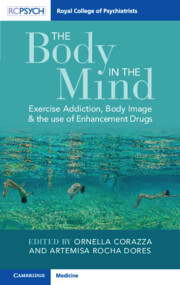Book contents
- The Body in the Mind
- The Body in the Mind
- Copyright page
- Dedication
- Contents
- Figures
- Tables
- Boxes
- Contributors
- Acknowledgements
- Introduction
- Section 1 From Exercise to Addiction: An Introduction to the Phenomenon
- Section 2 Reaching the Extreme with Exercise: A Collection of Clinical Case Studies
- Chapter 11 Being Versus Appearing: Two Sides of the Same Coin?
- Chapter 12 Reducing Excessive Exercise Behaviour Using Online Cognitive–Behavioural Therapy
- Chapter 13 The Story of My Life
- Chapter 14 Money Honey
- Section 3 Exploring the Motivations Behind Exercise Addiction
- Index
- References
Chapter 13 - The Story of My Life
from Section 2 - Reaching the Extreme with Exercise: A Collection of Clinical Case Studies
Published online by Cambridge University Press: 30 March 2023
- The Body in the Mind
- The Body in the Mind
- Copyright page
- Dedication
- Contents
- Figures
- Tables
- Boxes
- Contributors
- Acknowledgements
- Introduction
- Section 1 From Exercise to Addiction: An Introduction to the Phenomenon
- Section 2 Reaching the Extreme with Exercise: A Collection of Clinical Case Studies
- Chapter 11 Being Versus Appearing: Two Sides of the Same Coin?
- Chapter 12 Reducing Excessive Exercise Behaviour Using Online Cognitive–Behavioural Therapy
- Chapter 13 The Story of My Life
- Chapter 14 Money Honey
- Section 3 Exploring the Motivations Behind Exercise Addiction
- Index
- References
Summary
Metacognitions, or the beliefs one holds about internal mental states and the strategies aimed at controlling them, are known to play a significant role in the development and maintenance of addictive behaviours. However, only very limited research has investigated the role of metacognitions in exercise addiction (EA). This chapter describes the case of a 36-year-old woman with EA, whose metacognitive strategies appeared to be directly linked to her addictive behaviour. The risky behaviours and detrimental effects on other aspects of life that are observed in individuals with EA appear to be as harmful to their physical and mental health as are the addiction-related behaviours and effects observed among people with substance use disorders. It is proposed that EA is a specific behavioural addiction that merits inclusion as a mental disorder in the International Classification of Diseases and the Diagnostic and Statistical Manual of Mental Disorders.
- Type
- Chapter
- Information
- The Body in the MindExercise Addiction, Body Image and the Use of Enhancement Drugs, pp. 177 - 184Publisher: Cambridge University PressPrint publication year: 2023

